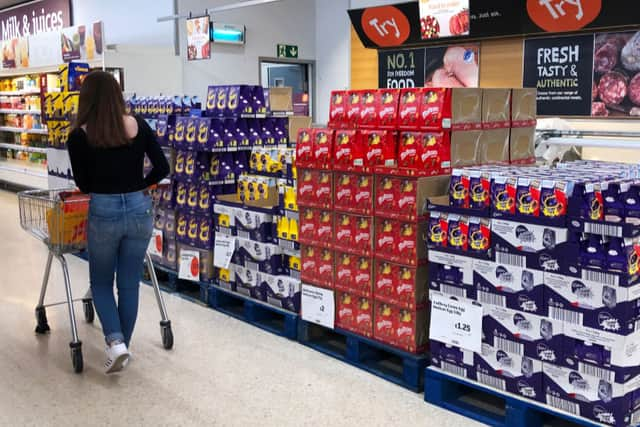Chocolate and sweet prices jump ahead of Easter as sugar cost drives food inflation to record high
and live on Freeview channel 276
The prices of chocolate, sweets and fizzy drinks have jumped ahead of the Easter holidays as shop price inflation hit a new high in March.
The British Retail Consortium (BRC) said rising sugar and manufacturing costs has pushed food inflation to 15% in the year to March, up from 14.5% last month, while the price of fresh food is now 17% higher than last March – the highest rate on record.
Fruit and vegetable prices also rose as poor harvests in Europe and North Africa limited availability, the group said. Inflation on items other than food also reached a new record of 5.9%, up from 5.3% in February.
Shop prices are now 8.9% higher than they were a year ago, up from February’s 8.4% increase, according to the BRC-NielsenIQ index, and experts warn that soaring food costs are yet to peak.


BRC chief executive Helen Dickinson said: “Shop price inflation has yet to peak. Food price rises will likely ease in the coming months, particularly as we enter the UK growing season, but wider inflation is expected to remain high.”
Mike Watkins, head of retailer and business insight at NielsenIQ, said inflation is continuing to impact the spending power of shoppers and higher energy bills from April will only add further pressure.
He said: “Since food prices have risen retailers have seen more visits but less basket spend, as shoppers manage their weekly food bills by shopping little and more often and seeking out the lowest prices. And as Easter approaches some high street retailers will also be offering discounts and promotions to encourage customers to spend.”
Separate figures show grocery price inflation hit another record high to add a potential £837 to annual household bills, with supermarket inflation reaching 17.5% in the month to 19 March, up from 17.1% in February, analysts Kantar said.
Shoppers are now increasingly “taking action” by turning to multiple supermarkets in search of the best value, with footfall up at every grocer and households going to the shops just over four times a week in March – the highest frequency seen since the start of the pandemic apart from Christmas.
Fraser McKevitt, head of retail and consumer insight at Kantar, said: “Unfortunately, it’s more bad news for the British public, who are experiencing the ninth month of double-digit grocery price inflation. However, shoppers are taking action and clearly hunting around for the best value.
“This is a fiercely competitive sector and if people don’t like the prices in one store they will go elsewhere, with consumers visiting three or more of the top 10 retailers in any given month on average.”
Retailers are also using loyalty card schemes in a bid to attract and retain shoppers, and more than nine in 10 consumers use at least one of the schemes, Kantar said.
Shoppers are also trying to offset rising prices by choosing more own-label lines, although branded goods still make up 52% of the market. Sales of chocolate Easter eggs are also up 6% on last year and sales of hot cross buns up by 5%.
Last week the Office for National Statistics (ONS) reported that UK inflation shot up unexpectedly from 10.1% in January to 10.4% in February as the vegetable shortages pushed food prices to their highest rate in more than 45 years.
Comment Guidelines
National World encourages reader discussion on our stories. User feedback, insights and back-and-forth exchanges add a rich layer of context to reporting. Please review our Community Guidelines before commenting.
